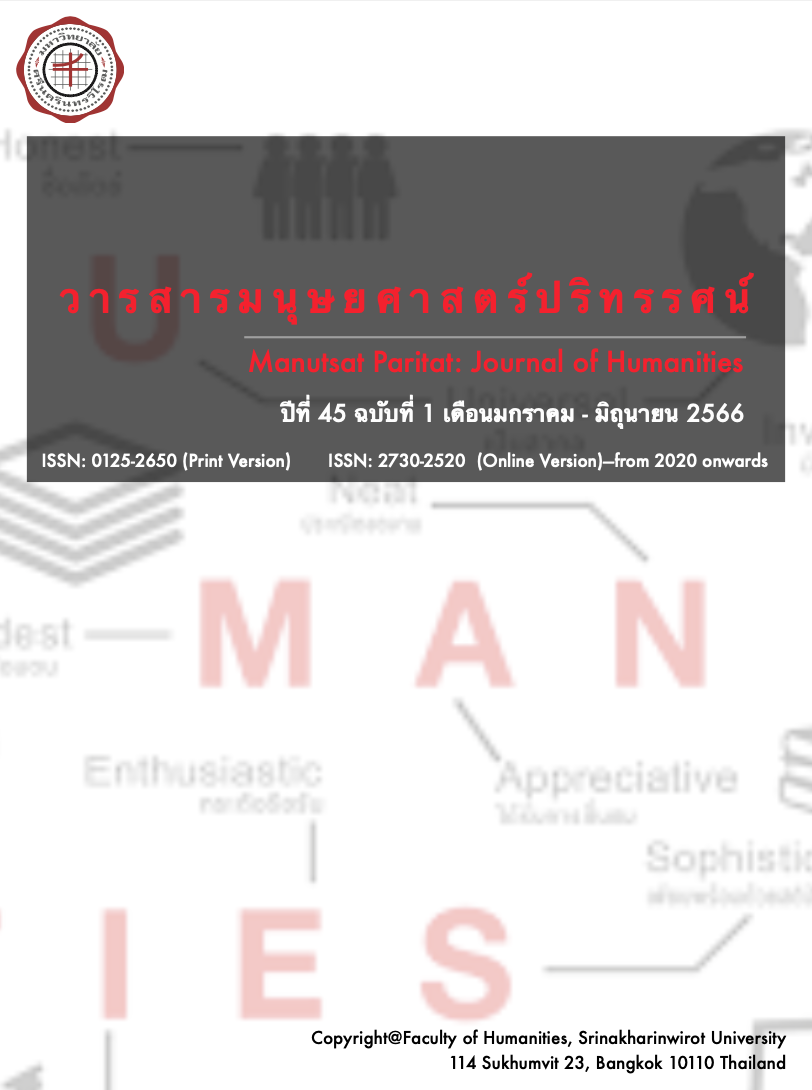ผลของการจัดการเรียนรู้โดยใช้สื่อประสาทสัมผัสในระบบการสอนแบบมอนเตสซอรี่ที่มีต่อทักษะการคิดเชิงบริหารของเด็กปฐมวัย
Main Article Content
บทคัดย่อ
บทความวิจัยนี้มีวัตถุประสงค์เพื่อ 1) เปรียบเทียบทักษะการคิดเชิงบริหารโดยใช้การจัดการเรียนรู้ด้วยสื่อประสาทสัมผัสในระบบการสอนแบบมอนเตสซอรี่ ของเด็กปฐมวัยที่มีความพร้อมมาก พร้อมปานกลาง และพร้อมน้อย โดยแบ่งกลุ่มด้วยแบบประเมินพัฒนาการด้านการคิดเชิงบริหาร (EF) และ 2) ศึกษาความคิดเห็นของเด็กปฐมวัยที่มีต่อการจัดการเรียนรู้โดยใช้สื่อประสาทสัมผัสในระบบการสอนแบบมอนเตสซอรี่ กลุ่มตัวอย่างที่ใช้ในการวิจัยคือ เด็กปฐมวัยระดับชั้นปฐมวัยปีที่ 1-3 ที่กำลังศึกษาอยู่ในภาคเรียนที่ 1 ปีการศึกษา 2565 ที่โรงเรียนสังกัดเอกชนแห่งหนึ่งในจังหวัดสมุทรสาคร จำนวน 52 คน ได้มาจากการสุ่มแบบกลุ่ม (Cluster Random Sampling) เครื่องมือที่ใช้ในการวิจัย ได้แก่ 1) แผนการจัดการเรียนรู้โดยใช้สื่อประสาทสัมผัส จำนวน 4 แผน 2) แบบประเมินพัฒนาการด้านการคิดเชิงบริหาร (EF) ในเด็กวัยก่อนเรียน จำนวน 32 ข้อ มีลักษณะเป็นมาตราส่วนประมาณค่า 5 ระดับ และ 3) แบบสัมภาษณ์ความคิดเห็นของเด็กปฐมวัยที่มีต่อการจัดการเรียนรู้ วิเคราะห์ข้อมูลโดยการหาค่าเฉลี่ย ส่วนเบี่ยงเบนมาตรฐาน และการวิเคราะห์ความแปรปรวนทางเดียว (One-Way ANOVA) ผลการวิจัยพบว่า 1) เด็กปฐมวัยที่ได้เรียนรู้โดยใช้การจัดการเรียนรู้ด้วยสื่อประสาทสัมผัสในระบบการสอนแบบมอนเตสซอรี่ มีค่าเฉลี่ยของผลการประเมินทักษะการคิดเชิงบริหารหลังเรียนสูงกว่าก่อนเรียน เมื่อวิเคราะห์ความแปรปรวนของผลการประเมินพัฒนาการด้านการคิดเชิงบริหารในเด็กวัยก่อนเรียน พบว่า ระดับความพร้อมของเด็กที่แตกต่างกันระหว่างกลุ่มพร้อมน้อย พร้อมปานกลาง และพร้อมมาก ทำให้ผลการประเมินทักษะการคิดเชิงบริหารแตกต่างกันอย่างมีนัยสำคัญทางสถิติที่ .05 และ 2) เด็กปฐมวัยแสดงความคิดเห็นทั้งชอบและไม่ชอบกับการทำงานประสาทสัมผัส แต่เด็กสามารถทำงานได้เพื่อพัฒนาทักษะการคิดเชิงบริหารของตนเอง และเด็กมีทักษะการคิดเชิงบริหารที่ดีขึ้นหลังการจัดการเรียนรู้โดยใช้สื่อประสาทสัมผัสในระบบการสอนแบบมอนเตสซอรี่
Article Details

อนุญาตภายใต้เงื่อนไข Creative Commons Attribution-NonCommercial-NoDerivatives 4.0 International License.
การคัดลอก ตีพิมพ์ซ้ำ การเผยแพร่ซ้ำบทความใด ๆ ก็ตามที่ปรากฎอยู่ในวารสารมนุษยศาสตร์ปริทรรศน์ ถือเป็นการละเมิดสิทธิในความเป็นเจ้าของของบทความดังกล่าวที่ปรากฎอยู่ในวารสารมนุษยศาสตร์ปริทรรศน์ กรุณาติดต่อ MPJHthaijo@gmail.com เพื่อขออนุญาตคัดลอก ตีพิมพ์ซ้ำ เผยแพร่ซ้ำบทความใด ๆ ก็ตามที่ปรากฎอยู่ในวารสารมนุษยศาสตร์ปริทรรศน์ ลงในสื่อสิ่งพิมพ์ต่าง ๆ หรือสื่อออนไลน์
เอกสารอ้างอิง
กมลรัตน์ คนองเดช, สุนิศา ธรรมบัญชา, อาทิตยา วงศ์มณี, เสาวลักษณ์ สมวงษ์, และนวพร แซ่เลื่อง. (2563). ผลการจัดการณ์โดยใช้สื่อและของเล่นที่มีทักษะ EF ของเด็กปฐมวัย ในโรงเรียนร่วมพัฒนาวิชาชีพครู เขตพื้นที่จังหวัดชายแดนใต้. มหาวิทยาลัยราชภัฎยะลา, ยะลา.
จุฬินฑิพา นพคุณ. (2561). การพัฒนาทักษะสมองเพื่อชีวิตที่สำเร็จในศตวรรษที่ 21 สำหรับเด็กปฐมวัยผ่านการสอนแบบมอนเตสซอรี่. วารสารศึกษาศาสตร์มหาวิทยาลัยศิลปากร, 16(1), 75-90.
จุฬินฑิพา นพคุณ. (2562). ทักษะการช่วยเหลือตนเองในชีวิตประจำวันของเด็กปฐมวัยผ่านการสอนแบบมอนเตสซอรี่ในกิจกรรมกลุ่มประสบการณ์ชีวิต. วารสารศึกษาศาสตร์, 30(2), 1-13.
นวลจันทร์ จุฑาภักดีกุล, ปนัดดา ธนเศรษฐกร, และอรพินท์ เลิศอวัสดาตระกูล. (2560). รายงานการวิจัยเรื่อง การพัฒนาและหาค่าเกณฑ์มาตรฐานเครื่องมือประเมินการคิดเชิงบริหารในเด็กปฐมวัย. นครปฐม: มหาวิทยาลัยมหิดล.
พัทธนิตย์ คุ้มครอง (2561). การพัฒนาความสามารถในการแก้ปัญหาของเด็กปฐมวัย โดยใช้การจัดประสบการณ์ตามรูปแบบมอนเตสซอรี่ (Montessori). วิทยาลัยครุศาสตร์ มหาวิทยาลัยธุรกิจบัณฑิตย์, กรุงเทพฯ.
ราชกิจจานุเบกษา. (2562). พระราชบัญญัติการเด็กปฐมวัย พ.ศ. 2562. สืบค้นจาก https://www.moe.go.th/ backend/wp-content/uploads/2020/10/1.-พรบ.-การพัฒนาเด็กปฐมวัย.pdf
วีระชาติ กิเลนทอง. (2560). สภาวะการศึกษาไทย ปี 2558/2559 ความจำเป็นของการแข่งขันและการกระจายอำนาจในระบบการศึกษาไทย. สำนักวิจัยและพัฒนาการศึกษา สำนักงานเลขาธิการสภาการศึกษา, กรุงเทพฯ
ศศิลักษณ์ ขยันกิจ. (2558). ปฐมวัย : ลงทุนอย่างไรให้คุ้มค่า. สืบค้นจาก http://www.thaihealth.or.th/ Content/27887
สุภาวดี หาญเมธี.(2560). EFทักษะสมองเพื่อการจัดการชีวิตให้สำเร็จ (Executive Functions). กรุงเทพฯ: โรงพิมพ์อักษรสัมพันธ์ (1987) จำกัด.
อภิรักษ์ ตาแม่ก๋ง. (2562). ผลของโปรแกรม I AM TAP ต่อทักษะการคิดเชิงบริหารของเด็กปฐมวัย. มหาวิทยาลัยศรีนครินทรวิโรฒ กรุงเทพฯ.
Anderson, V., Levin, H. S., & Jacobs, R. (2002). Executive functions after frontal lobe injury: A developmental perspective. Oxford University Press.
Baddeley, A. (1998). "The central executive: a concept and some misconceptions." Journal of the International Neuropsychological Society, 4(5), 523-526.
Blair, C., & Razza, R. P. (2007). Relating effortful control, executive function, and false belief understanding to emerging math and literacy ability in kindergarten. Child Development, 78(2), 647-663.
Casey, B. J., Tottenham, N., Liston, C., & Durston, S. (2005). Imaging the developing brain: What have we learned about cognitive development. Trends in Cognitive Sciences, 9(3), 104-110.
Center on the Developing Child at Harvard University. (2014). Enhancing and practicing executive function skills with children from infancy to adolescence. https://developingchild.harvard.edu/science/key-concepts/executive-function
Diamond, A. (2013). Executive functions. Annual Review of Psychology, 64(1), 135–168.
Diamond, A. (2014). Want to Optimize Executive Functions and Academic Outcomes? Simple, Just Nourish the Human Spirit. Minnesota Symposia on Child Psychology, 37(1), 205–232.
Friedenberg, J., & Silverman, G. (2006). Cognitive Science: An introduction to the study of mind. Sage Publications.
McClelland, M. M., Cameron, C. E., Duncan, R., Bowles, R. P., Acock, A. C., Miao, A., & Pratt, M. E. (2014). Predictors of early growth in academic achievement: The head-toes-knees-shoulders task. Frontiers in Psychology, 5(1), 599 (1- 14).
Meltzer, L. (2007). Executive functions in education: from theory to practice. The Guilford Press.
Moffitt, T. E., Arseneault, L., Belsky, D. W., Dickson, N., Hancox, R. J., Harrington, H. L., Houts, R., Poulton, R., Roberts, B. W., Ross, S., Sears, M. R., Thomson, W., & Caspi, A. (2011). A gradient of childhood self-control predicts health, wealth, and public safety. Proceedings of the National Academy of Sciences, 108(7), 2693-2698.
Pikkert, J. J. J., & Foster, L. (1996). Critical thinking skills among third year Indonesian English students. Regional Language Centre Journal, 27(2), 56-64.
Pollard, A. (1996). Reflective teaching. New York University Press.
Tishman, S., Perkins, D. N., & Jay, E. (1995). The thinking classroom: Learning and teaching in a culture of thinking. Allyn and Bacon.
Thorell, L. B., Lindqvist, S., Nutley, S. B., Bohlin, G., & Klingberg, T. (2009). Training and transfer effects of executive functions in preschool children. Developmental Science, 12(1), 106-113.
Willoughby, M. T., Magnus, B., Vernon-Feagans, L., & Blair, C. B. (2017). Developmental delays in executive function from 3 to 5 years of age predict kindergarten academic readiness. Journal of Learning Disabilities, 50(4), 359-372.


